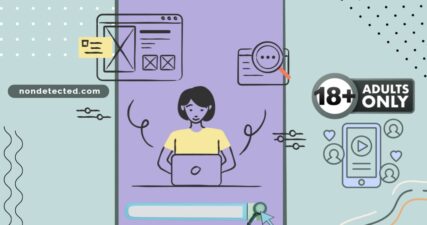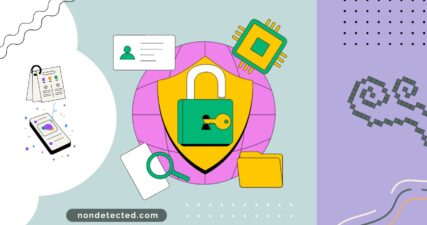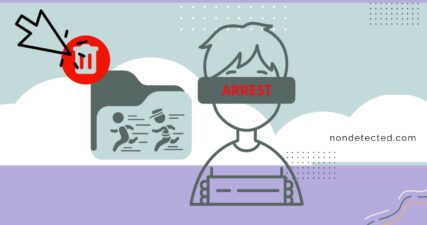Can You Legally Make Someone Delete Pictures of You?
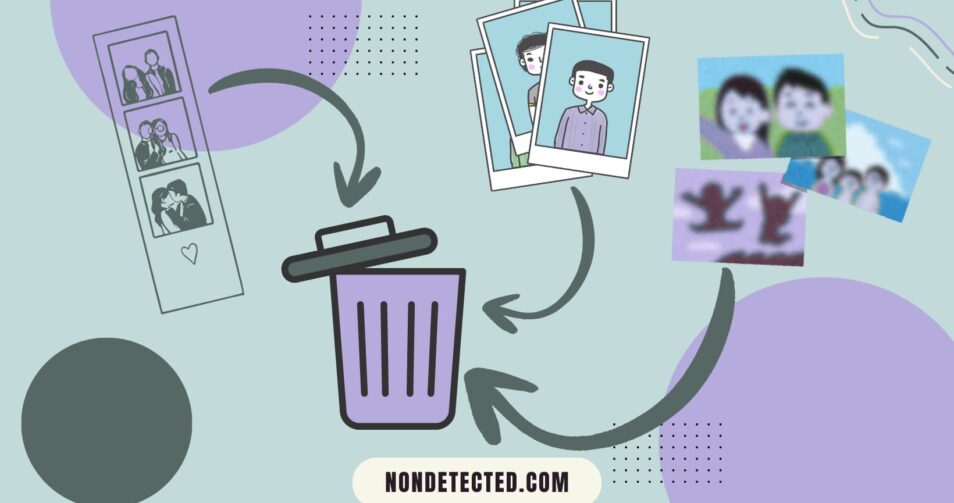
Our world is hyper-connected, so taking and sharing pictures has become a natural thing. Since such things are everywhere, it is important to know how to remove pictures of yourself from the internet. It can be anything from a quick selfie to a group shot at a party, and most of the time, these images do not harm our digital lives. However, a photo can be shared without your permission.
This scenario is more common than you might think, and it raises a very important question: whether it is possible to make someone legally remove your pictures. The answer is not always straightforward, but the issue can be solved, especially when the law is on your side.
Table of Contents
- What Are the Legal Grounds for Removing Photos?
- Real-Life Stories: When Photo or Video Crosses the Line
- How Big Is the Problem?
- Is It Really Possible to Make Someone Delete Your Pictures?
- A Guide on Legal Removal
- What Should I Do If They Refuse to Delete Pictures?
- Let Us Help You Solve the Issue Forever
What Are the Legal Grounds for Removing Photos?
What to do if someone is posting pictures of you onlines? To answer this question, you need to understand what the legal grounds are. The thing is that there are statutes protecting privacy and intellectual property rights, and they can be used to make someone erase the photos of you.
At NonDetected, we have enough experience in solving such problems, so we can introduce a list of common situations.
Copyright Infringement
If you took a photo or video yourself, you usually own the copyright. That means that you can decide how and where it is shared. If someone posts your content without permission, you can send them a copyright notice under the Digital Millennium Copyright Act (DMCA) asking them to take it down.
To send a DMCA notice, you need to provide the following:
- Your signature (or your agent’s signature).
- A description of the copyrighted work.
- Details about where and how it is being used without permission.
- Your contact information.
- A statement that you believe the use is not authorized.
- A statement that the information you are providing is correct and that you are allowed to act for the copyright owner.
If the person still refuses to delete the content, you can register the copyright and consider taking legal action in federal court. In other cases, you can also consult some experts who specialize in your local law enforcement.
If you need help, we offer professional DMCA takedown services with guaranteed results.
Invasion of Private Information
Can you legally make someone delete pictures of you in this case? Even if you do not own the copyright, you might have a privacy claim if the photo was taken or shared without your permission. This is especially true in situations where you had a reasonable expectation of privacy.
Here are four common privacy claims:
- Intrusion into your private life. Someone invaded your privacy in an offensive way.
- Public disclosure of private facts. They shared private, truthful information that the public did not need to know.
- False light. Someone presented you in a misleading or false way that would upset most people.
- Misusing your image. Somebody used your name or photo to make money without your permission.
Defamation
Posting a photo might also be considered defamation if it is shared along with false, damaging claims about you.
To prove defamation, you usually need to show accurate evidence :
- A false statement of fact about you.
- Communication or publication of that statement about you.
- A fault that amounts to at least negligence.
- Any harm caused to you by that statement.
For example, if someone posts your photo with a fake caption saying you are a criminal, you could have a defamation case.
Emotional Distress
At times, even if posting the picture is not illegal by itself, doing that to intentionally hurt you might count as intentional infliction of emotional distress (IIED). This applies if the person meant to cause you serious emotional harm and succeeded.
A common example is “revenge porn,” where someone posts private, intimate photos to shame or upset you. Many regions worldwide now have specific laws that make this a crime.
Real-Life Stories: When Photo or Video Crosses the Line
To understand what this issue is about better, as well as what to do if someone is blackmailing you with photos online, you might need to read a few real-life stories. Further, you can find some of them.
Georgia Harrison’s Victory
UK reality TV star Georgia Harrison became a public face of the fight against non-consensual image sharing when her ex-boyfriend posted a private video of her online. Harrison took legal action and won. Her case sent a strong message that victims can fight back and win in court.
Chris Olsen’s Struggle
In the US, TikTok influencer Chris Olsen discovered explicit images of himself being shared on social media without his permission. Despite reporting them, the images kept spreading. His public outcry highlighted just how difficult it can be to remove unwanted photos, even for someone with a large online following.
Everyday People, Everyday Problems
These issues are not limited to celebrities. In 2023, the UK’s Revenge Porn Helpline handled over 19,000 reports from everyday people trying to get images taken down.
These included photos shared by ex-partners, images taken in public without permission, and even sextortion cases where people were blackmailed over their pictures.
So, What is the REAL Problem?
It is critical to know what to do if someone is posting pictures of you onlines because this issue is not only common but it is also growing fast: talking about it can help raise awareness.
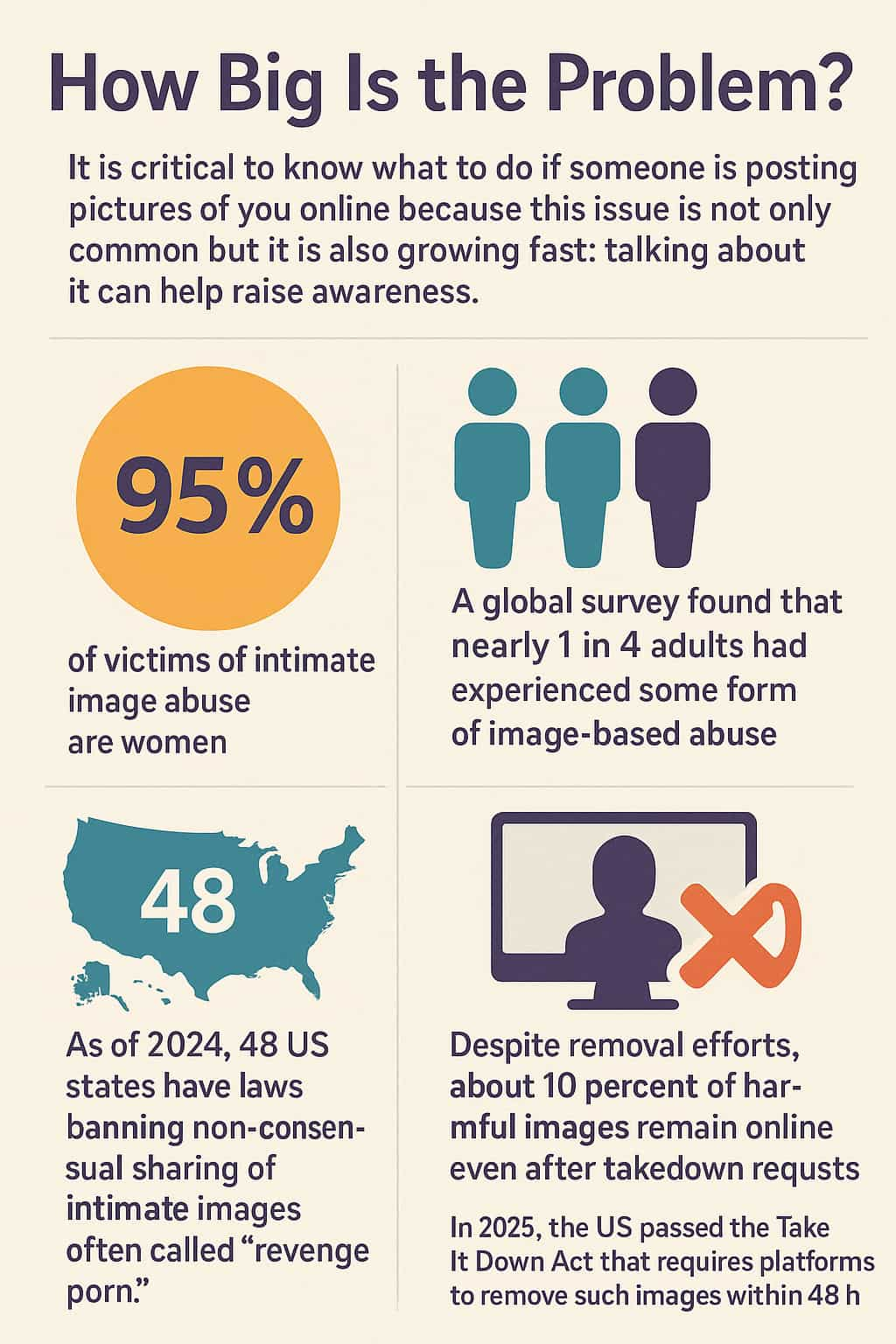
- In the UK, reports of non-consensual image sharing doubled between 2022 and 2023.
- 95 percent of victims of intimate image abuse are women.
- A global survey found that nearly 1 in 4 adults had experienced some form of image-based abuse.
- As of 2024, 48 US states have laws banning non-consensual sharing of intimate images, often called “revenge porn.”
- Despite removal efforts, about 10 percent of harmful images remain online even after takedown requests.
As AI-generated deepfakes become more common, the problem is only expected to worsen. This have also become popular with famous people and their generated mugshots that appear online. In 2025, the US passed the Take It Down Act that requires platforms to remove such images within 48 hours. Still sometimes it requires a lot of time and effort to use this one to get a successful result.
Is It Really Possible to Make Someone Delete Your Pictures?
You can really make a person erase your photos, but everything depends on:
- What kind of image it is about, because intimate, private, or manipulated images have stronger legal protections.
- How it was shared. If it was posted without your consent, especially for harm, you have legal rights.
- Where it was shared. The truth is that social media platforms have rules, but smaller websites can be trickier.
A Guide on Legal Removal
If you have identified that there is a legal basis and now you are thinking about how to remove pictures of yourself from the internet, it is time to take action and seek a reliable service . Further, you are going to find a guide from NonDetected:
- You should document everything. Before you contact those people, you need to document the unauthorized use of your picture. For this purpose, you should take screenshots of the web pages where it can be seen and save copies of the picture files. If there are comments or other contexts, it is important to capture them as well. The step is important because you need to collect evidence for legal action.
- You are to send a removal request. In many cases, you just need to ask the website or the individual to remove your picture, and they do that. Therefore, you should send them a message that identifies a certain image and explain why you want it to be deleted. If it is a large website, you should look for the designated copyright contact or the DMCA agent. The process can be much faster if you send the removal request to the right person.
- You should escalate to legal action. If they refuse to delete your picture after they get a formal legal notice, you must take legal action. It usually implies filing a lawsuit for copyright infringement, defamation, invasion of privacy, revenge porn, or any other legal claim that fits your situation.
Taking legal action can be time-consuming, especially if you do not understand how to remove pictures of yourself from the internet. That is why you should not hesitate to ask for help from a reliable agency, such as NonDetected. In this case, everything will be done for you, and you will get faster results.
What Should I Do If They Refuse to Delete Pictures?
Sadly, even if you follow all the mentioned steps and do everything properly, some individuals will still refuse to cooperate. The thing is that some websites ignore removal requests or make the process extremely difficult.
Moreover, if an image is online, it can quickly spread and show up on multiple sites, which makes it feel nearly impossible to fully erase the picture.
In some scenarios, even if you succeed in getting a photo taken down from one place, it might appear again somewhere else. This constant cycle can be extremely frustrating and exhausting. That is where getting professional help can make a real difference.
Let Us Help You Solve the Issue Forever
At NonDetected, we understand how terrible it is to feel like you have lost control over your own image. There is no need to deal with it on your own; let it be a private photo shared without permission or something damaging to your reputation.
We Understand What the RIGHT Legal Action is in Your Case
If you ask for our assistance, our professionals will do the following things using various working methods:
- Image tracking. Our experts search the internet to find every place your photo appears, including hidden sources or sources that are difficult to find.
- Takedown requests. We send legal notices to websites, search engines, and individuals, and request the fast removal of your image.
- Fast action. Our specialists work directly with platforms to get your photos erased as quickly as possible.
- Ongoing monitoring. We keep an eye on the internet to spot and stop reuploads before they spread again.
No one has to deal with this kind of stress by themselves. If you are upset and do not know how to remove pictures of yourself from the internet, you are welcome to contact us.
At NonDetected, we intend to help you take back your privacy, your peace of mind, and control over your own image while minimizing the costs involved .
